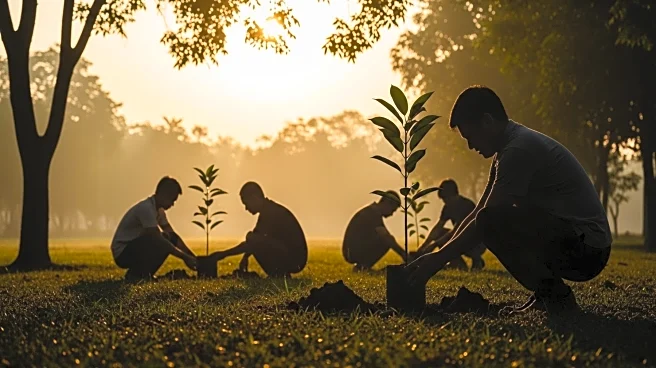What's Happening?
A delegation of 250 state legislators from all 50 U.S. states participated in a tree-planting ceremony at Park Ofakim in Israel. This event was organized by the Keren Kayemeth LeIsrael-Jewish National Fund (KKL-JNF) and took place in a city that was recently affected by a raid from Hamas on October 7. The initiative involved planting 50 trees, each representing a U.S. state, as a gesture of solidarity and friendship between the United States and Israel. The event was marked by speeches from various participants, including Maine State Senator Matthew Harrington, who emphasized the symbolic nature of the trees as a representation of growth and future collaboration.
Why It's Important?
This event underscores the ongoing diplomatic and cultural ties between the United States and Israel. By involving legislators from every U.S. state, the initiative highlights a unified stance of support and friendship towards Israel, particularly in light of recent conflicts. Such actions can strengthen bilateral relations and promote peace and cooperation. The symbolic planting of trees serves not only as a gesture of goodwill but also as a reminder of the shared values and mutual interests that bind the two nations. This could potentially influence future policy decisions and foster a deeper understanding and collaboration on international issues.
What's Next?
Following this event, it is likely that both nations will continue to explore avenues for collaboration and support. The symbolic act of planting trees may pave the way for further diplomatic engagements and initiatives aimed at strengthening ties. Additionally, the involvement of state legislators could lead to increased advocacy for policies that support U.S.-Israel relations at both state and federal levels. Observers may also watch for any reactions from other international stakeholders, particularly those with vested interests in Middle Eastern geopolitics.
Beyond the Headlines
The tree-planting ceremony also touches on broader themes of environmental stewardship and cultural diplomacy. By choosing to plant trees, the legislators are contributing to environmental conservation efforts, which can have long-term benefits for the region's ecosystem. Moreover, the event serves as a platform for cultural exchange and understanding, promoting peace and reconciliation in a region often marked by conflict. This initiative may inspire similar actions in other parts of the world, where diplomacy and environmentalism intersect.












